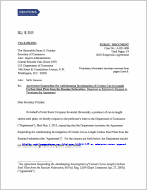Market Segment

May 21, 2015
Severstal Says Don’t Terminate CTL Plate Suspension Agreement
Written by Sandy Williams
Severstal says the DOC should not terminate the suspension agreement on cut-to-length steel plate from Russia. In a communication to the U.S. Secretary of Commerce, the Russian steel producer said there is no evidence that Russian steel imports of CTL are injurious to the U.S. domestic steel market.
 In its letter Severstal writes, “Petitioner’s request attempts to present a dire picture of large volumes of Russian CTL plate surging into the U.S. market in ever-increasing amounts and undercutting and suppressing U.S. prices to the detriment of the U.S. industry and the public interest. However, once the rhetoric is set aside and the actual numbers and statistics are examined objectively, it is clear that this is not the case. Russian volumes remain low, and prices commensurate with other merchandise of the same quality. Petitioner also tries to leverage the current political climate between the United States and Russia to its own benefit – again in the name of public interest. The Department should not allow this Agreement with Russian steel companies, i.e., not the Russian government, to be politicized by petitioner.”
In its letter Severstal writes, “Petitioner’s request attempts to present a dire picture of large volumes of Russian CTL plate surging into the U.S. market in ever-increasing amounts and undercutting and suppressing U.S. prices to the detriment of the U.S. industry and the public interest. However, once the rhetoric is set aside and the actual numbers and statistics are examined objectively, it is clear that this is not the case. Russian volumes remain low, and prices commensurate with other merchandise of the same quality. Petitioner also tries to leverage the current political climate between the United States and Russia to its own benefit – again in the name of public interest. The Department should not allow this Agreement with Russian steel companies, i.e., not the Russian government, to be politicized by petitioner.”
(SMU Note: Letter image is clickable and will take you to a PDF of the Severstal letter)
The rebuttal to US steel producer claims includes:
a. The volume of Russian CTL plate imports is not significant.
b. The cited percent increases in volumes of imports from Russia are misleading and do not show an injurious increase in volume.
c. Petitioner’s comparison of US and Russian CTL plate prices is fundamentally flawed.
d. Petitioner has presented no evidence to tie Russian imports to falling U.S. prices.
e. It is in the public interest for the United States to comply with its agreements.
Severstal notes that the 2,800 percent increase of CTL imports equals 55,000 metric tons—insignificant when compared to overall U.S. consumption of the product. Also, “the increase of 2,800 percent is due to the fact that there were almost no imports in 2013 (i.e., 1,877 tonnes), not due to a large amount of imports in 2014.”
The price comparison was not made on an “apples to apples” basis says Severstal, with the petitioners “cherry picking” prices to compare with the overall average U.S. Price.
The petitioner’s conclusion that Russian CTL is depressing U.S. prices is unsupported since the volume of imports is negligible and the prices are not compared correctly to comparable merchandise. Severstal notes that when the DOC terminated the Agreement Suspending the Antidumping Investigation of Certain Hot-Rolled Flat-Rolled Carbon-Quality Steel Products from the Russian Federation, market prices fell from $720 USD/tonnes to $498/tonnes.
The letter concludes:
“As demonstrated above, the volume of Russian CU plate imports is low, and increases are minimal. Moreover, these low volumes are not undercutting or depressing prices in the U.S. market. Further, Russian producers and exporters have not violated the terms of the Agreement. Therefore, the Agreement continues to work and the Department should not terminate it.







